- Home
- Joel C. Rosenberg
Epicenter 2.0 Page 10
Epicenter 2.0 Read online
Page 10
If that weren’t enough, Palestinian Prime Minister Mahmoud Abbas publicly said he welcomed Pakistan’s diplomatic contact with Israel.
“The foreign ministers of Israel and Pakistan, a Muslim country that has long taken a hard line against the Jewish state, met publicly for the first time Thursday, a diplomatic breakthrough that follows Israel’s withdrawal from the Gaza Strip,” reported the New York Times. “Israeli Foreign Minister Silvan Shalom hailed the meeting as ‘historic’ and said that following the Gaza withdrawal it is ‘the time for all of the Muslim and Arab countries to reconsider their relations with Israel.’”105
As 2005 came to a close, Lt. General Dan Halutz, the chief of general staff for the Israeli Defense Forces, gave an address at Tel Aviv University in which he summed up the apparent conundrum between war and peace.
On one hand, he warned that “economic sanctions won’t stop Iran’s determined efforts to acquire nuclear weapons” and that “Israel needs to prepare for the worst existential threat in its history.”
On the other hand, echoing Major General Amidror, Halutz said that ironically Israel was now enjoying one of the most secure seasons in its modern history. “I believe that our strategic reality at the moment is the best ever for the state. . . . When I look about, I find it difficult to see an Arab coalition rising against Israel. There is no unifying interest today for the Arab nations as there [was] in the past.”106
THE BEAR HUG
So which is it? Are Israel and her neighbors moving closer to war or to peace?
Nowhere was this conundrum more vividly on display for me than at the “Peace: Dream or Vision?” conference I attended in Israel in the fall of 2005, commemorating the tenth anniversary of the assassination of Yitzhak Rabin, the beloved Israeli prime minister who signed the historic peace treaty with Jordan’s King Hussein in 1994.
Outside the conference center at the Strategic Dialogue Center of Netanya Academic College were all the reminders of the “wars and rumors of wars” that Jesus said would plague the world until his return—a phalanx of heavily armed security guards, metal detectors, bomb-sniffing dogs, and so forth. To get in I had to not only show my passport to the security staff but give it to them to hold on to until I left, and my camera, camera bag, tape recorder, and briefcase were all searched carefully—as was I—before I was allowed to proceed.
But inside were all the reminders of Israelis “living securely” in “the land that is restored from the sword,” which Ezekiel predicted. One moment I was watching former Mossad chief Danny Yatom chatting like old buds with Dr. Abdel Salam Majali, the former Jordanian prime minister, and Osama El-Baz, the chief political advisor to Egyptian president Hosni Mubarak. The next moment I was watching Saeb Erekat, the Palestinian chief negotiator, give a bear hug to former Israeli prime minister Shimon Peres. Once they were all enemies. Now they were all friends. Once they were plotting each other’s demise. Now they were talking about their shared vision for a “new Middle East.”
Such warm relationships between Arab and Israeli leaders may seem insignificant, but they most certainly are not. They actually represent enormous progress toward resolving the conflict. Let me give you a little anecdote to provide some context.
In April of 1988, ABC’s Ted Koppel took Nightline to Israel for a week of broadcasts on the outbreak of the Palestinian uprising known as the intifada and the increasingly desperate need for peace and reconciliation between the two sides. Having recently returned to the States after nearly six months in Israel, where I had studied at Tel Aviv University and witnessed the outbreak of the intifada, I watched Koppel’s show with great interest every night in my dorm room at Syracuse University.
On April 25, Koppel held the first-ever town hall meeting between Israelis and Palestinians, broadcast live from the historic Jerusalem Theater. It was bound to be riveting television, for never before had Israeli and Palestinian leaders sat on the same stage together, much less engaged in anything close to a dialogue. But when the show began, I was surprised to see a three-foot-high stone wall running down the middle of the stage. The Israelis sat on one side, the Palestinians on the other. It was a sad symbol of the divide between the two peoples.
Years later, I was interviewed by Koppel on Nightline. After the taping was finished, I had the opportunity to ask Koppel about that wall. “It came up at almost the last minute,” he explained, remembering the moment vividly. “We were just a few hours from going on live from Jerusalem—at 6:30 in the morning, Israel time, mind you, so that the show would be on at 11:30 p.m. back in the U.S.—and suddenly the Palestinians said they refused to appear onstage with the Israelis without sitting in a booth, so they didn’t appear to actually be talking to the Israelis. We said absolutely not. So they asked that we put razor wire down the center of the stage, and again we said no. Finally, they asked that we build a wall—just a small wall, they said—to represent how divided Arabs and Jews are. They threatened not to appear at all if we didn’t do it, so we did it. It was an amazing night.”107
It certainly was. And one of the Palestinians who appeared onstage that night was Saeb Erekat. Then he had refused to shake hands with the Israelis. He had barely made eye contact with them. And he had demanded a wall. Now, at the peace conference in Netanya, he was giving bear hugs. How much the world had changed.108
“A NEW AGE” IN THE MIDDLE EAST?
Shimon Peres is a living legend in Israel and is one of the country’s founding fathers. I have long disagreed with his Socialist economic views and a foreign policy too dovish, in my opinion. But I have always respected this man who served his country not once but three times as prime minister and in numerous other ministerial positions and who won the Nobel Peace Prize in 1994.
I had never met the former prime minister before that conference in Netanya, but having worked for Benjamin Netanyahu—who defeated Peres in 1996—I was very much looking forward to it.
Now in his eighties, Peres is quieter and slower and more grandfatherly than he once was, but he is still a dreamer. He told the assembled dignitaries that he believes the Middle East is entering “a new age” and that he has never been more optimistic that a final peace agreement with the Palestinians can be reached in the not-too-distant future.
“The Lord is in charge of the beginning and the end, but we are responsible for the middle,” he said, insisting that there is no contradiction between fighting terror and negotiating for peace. “When a cat is chasing a mouse, there’s no sense for the mouse to ask for a cease-fire. He must deal with the cat and insure his own safety.”
After Peres’s keynote address, I had a few minutes to interview the former prime minister. “Is it your sense that Israel is more secure today—before we get to the point of the Iran nuclear bomb—than it has been in its history so far?” I asked.
Peres agreed with that assessment. “I would say that Israel’s security was globalized,” he explained in his distinctive, gravelly voice, suggesting that with the U.S. as a strong ally, the fall of Saddam, and peace treaties in place with Egypt and Jordan, the threat Israel faces today is “the problem of terror, rather than a classical attack” by a conventional Arab army or air force.109
Had the passing of Arafat—the Nobel Peace Prize winner who never actually made peace—helped or hurt the prospects for a final deal with the Palestinians? I wondered.
“With him, [the peace process] wouldn’t have started,” Peres insisted. “With him, it wouldn’t be finished.”
When Peres’s address was complete, attention turned to Saeb Erekat—the bald, tanned, fiery chief diplomatic spokesman for the Palestinian Authority—who delivered remarks on behalf of President Mahmoud Abbas. Erekat was as passionate as ever but not nearly as provocative as I had heard him in the past. To the contrary, he said he believed “it’s probable that we would have had peace if Mr. Rabin had not been assassinated” and called Israel’s evacuation from Gaza “an historic step.” And then he stunned me and much of the audience by saying th
at he and Abbas believed the end of the conflict with Israel was not only in sight but within reach.
“We are prepared to make a final settlement with Israel,” Erekat said, explicitly on behalf of Abbas. “We have the experience. We have the knowledge. We have learned from our mistakes. . . . We need no more than six months to conclude a final peace agreement with the Israelis. . . . What we are going through now are labor pains.”
Erekat went on to clarify that neither Abbas nor he was saying that a final deal would be wrapped up six months from then, November 2005. But they were saying that once Palestinians and Israelis held elections, put their governments in place, and finally came back to the negotiating table ready to get serious, enough of the diplomatic work had already been done that both sides were now truly within striking distance of a historic deal.
After Erekat stepped down from the podium, I met with him outside the conference center to press him on that point.
“You really think you’re within six months of a deal?” I asked, still wondering if I had heard him right.
Apparently I had. Erekat not only confirmed what he had told the roomful of Arab and Israeli diplomats, ex-military leaders, professors, political analysts, and students. He went further.
“What people don’t know is that me and my [Israeli] colleagues in the last days of [the administration of Israeli prime minister Ehud] Barak drafted three chapters of a permanent status treaty.” Most of the work was finished, he told me. “You don’t need to reinvent the wheel now. We know what it’s going to take.”
Still a bit taken aback, I asked him, “Isn’t this the most optimistic a Palestinian negotiator has ever been?”
He shook his head. “Look, I don’t base anything on optimism or pessimism. But when I say this line on behalf of my president, I know what I’m talking about. . . . We’re doing this because we realize it’s not a zero-sum game. . . . Two states. This is it. You want it? Okay, then let’s do it.”110
DOES HAMAS NIX PROSPECTS FOR PEACE?
All this talk of a final peace deal was before the radical Islamic movement Hamas was voted into leadership in the Palestinian parliament by a landslide election in January 2006. And before Ariel Sharon’s stroke and subsequent coma. And Iran’s threat to “wipe Israel off the face of the map.” And the Kremlin’s invitation for Hamas leaders to wine and dine in Moscow. But despite the assessment by many that the Hamas victory nullified any prospects for a peace deal, several important voices in the region say that is not necessarily the case.
Israeli prime minister Ehud Olmert is one such voice. Convinced that Israel is more secure than at any other time in its modern history, he has vowed to draw Israel’s final, permanent borders by 2010, with or without a Palestinian partner. He says that he will wait for a while to see if Hamas will renounce violence and accept Israel’s right to exist. But, he adds, “I don’t intend to wait forever.” If the Palestinians do not or cannot step forward to negotiate a final agreement, Olmert will unilaterally decide upon “Israel’s permanent borders, whereby we will completely separate from the majority of the Palestinian population.” His plans call for Israel’s withdrawing from roughly 80 to 90 percent of Judea and Samaria (commonly known as the West Bank) while annexing major Jewish settlement blocs around Jerusalem and retaining the strategic Jordan Valley as a buffer zone against any future ground-force attacks from the east. Such plans also include dividing Jerusalem and allowing the Palestinians to declare part of Jerusalem as their own capital.
Shaul Mofaz, a top military advisor to the prime minister, confirms that Olmert prefers to negotiate the final agreement with the Palestinians based on the Road Map drafted by the Bush administration, but he says, “If we see that we do not have a partner, then I think we will need to take our fate into our own hands and make a decision where it is right to be and where it is not right to be.”111
As the Palestinians’ chief negotiator, Saeb Erekat is another voice saying the Hamas victory is not a deal killer. “We urge Mr. Olmert to resume permanent status negotiations with us,” says Erekat, though he adds that “the road to peace and security in the region is not through unilateralism, the building of walls and settlements.”112
Erekat’s boss, Palestinian president Mahmoud Abbas, agrees. “We are in a historic period, in which we must decide whether we will move toward peace and a better future for our children,” Abbas told Haaretz, one of Israel’s leading daily newspapers. “I can promise that you have a partner for this peace. . . . The leadership of both peoples and also of the international community has a supreme responsibility to exploit this opportunity. It may be the last hope to accord the two peoples their right to live in security and stability. The coming generations will not forgive us if we let it slip by.”113
Abbas noted that despite the Hamas victory, a majority of Palestinians reject the Hamas platform of liquidating Israel. “If we reach an agreement [with Israel],” he insisted, “I will be the one to sign it. If needed, I will put it to a referendum. I received 62 percent in the elections, in which I condemned violence outspokenly. I am certain that I will also succeed in getting a majority for a peace agreement.”
But Abbas warned that time is of the essence and that the opportunity must not be allowed to slip away. “According to [the] Oslo [Accords], we were supposed to reach a final status agreement by May 1999, and we saw what happened,” the Palestinian leader told Haaretz. “Yitzhak Rabin was assassinated. Shimon Peres lost the elections, and Benjamin Netanyahu destroyed everything. I am proposing to you to sit now and discuss the end of the conflict. I [have] proposed to [Shimon] Peres and the Americans to open a back channel of talks, far from the spotlight. And I am convinced that . . . we will be able to sign an agreement.”
In June of 2006, I discussed Abbas’s views with General Nasser Youssef and Abdel Salam Majali.
Youssef once served as a senior military advisor to Yasser Arafat but became disillusioned by the rampant corruption in the Palestinian Authority and the lack of real peace and prosperity for the Palestinian people despite years of negotiations with the Israelis. In fact, in September 2003, when Youssef was appointed interior minister, he actually called Arafat “the most incompetent revolutionary leader in history” to Arafat’s face.114 Today he serves as national security advisor to the Palestinian chairman, a position that almost cost him his life when radical Islamic gunmen shot up his house in January 2006 while he was inside.
Majali was the prime minister of Jordan who took the lead in negotiating the peace treaty between Jordan and Israel and actually signed the treaty with Israel in 1994. Today he serves in the Jordanian senate and remains a top advisor to King Abdullah II.
Remarkably, both men share Abbas’s optimism about hammering out a final peace deal with Israel in the not-too-distant future. In fact, they believe that such a deal should include some sort of formal federation or confederation between the Palestinian entity and the kingdom of Jordan.
“All sides would benefit from such a relationship” between the Palestinians and Jordan, says Youssef. “I believe Palestinians will achieve their hopes of achieving a state by working closely with Jordan.”115
Majali, who first floated the idea of such a West Bank–Jordanian alliance in 1988, suggests the new entity be called the “United Arab States” or the “United Hashemite States” and be patterned after the European Union or the “Benelux” countries of Belgium, the Netherlands, and Luxembourg. There would essentially be two distinct states—one Palestinian and one Jordanian—but they would be tied together diplomatically, militarily, and economically. Citizens would choose their nationality, either Jordanian or Palestinian, on their passports and ID cards. Both governments would be democratic. Militants would be arrested or deported. And the leadership of the entity would rotate between a Jordanian and a Palestinian executive every four years.
“This idea could really be the light at the end of the tunnel” of the Arab-Israeli conflict, says Majali. “A Palestinian state alone is not goin
g to be viable. . . . But a confederation with Jordan will give Palestinians the prospect of being part of a truly functioning and successful state. It will give Jordanians assurance that the West Bank won’t become a breeding ground for radicals and militants. And it will give the Israelis the assurance that Jordan will help maintain internal security as well as a secure border to the East. . . . You have to give the Israelis the feeling of security, otherwise the Palestinians will never get a state.”116
Are Olmert, Abbas, and these others only dreaming? Perhaps, and events in the region are far too volatile to make any predictions about when a final agreement between the Israelis and Palestinians will happen or what such an agreement will look like.
What’s more, I should note here that while I strongly support giving the Palestinians autonomy to govern themselves without interference from Israel in return for true peace and stability in the lands run by the Palestinians, I personally oppose the notion of the State of Israel giving away the ancient lands of Judea and Samaria in order to create a sovereign Palestinian state that could become a base camp for anti-Israel and anti-Western terrorism and that could form alliances with radical Islamic regimes such as Iran, which would pose a clear and present danger to Israel, Jordan, and American interests in the region. But that is not the point of this chapter.
The point here is that never before in her modern history has Israel been so secure, so prosperous, so eager to give up land for peace, and—with Yasser Arafat off the political stage—seemingly so close to consummating the deal.
Could we see Israel sign a peace treaty with the Palestinians (and even other Arab nations, such as Lebanon or Syria) before the War of Gog and Magog unfolds? Yes, we could. Could the Jewish state discover massive reserves of oil and gas and become phenomenally wealthy before Moscow, Tehran, and their allies make their move against Israel? Yes, it could.

 The Copper Scroll
The Copper Scroll The Auschwitz Escape
The Auschwitz Escape The Last Jihad
The Last Jihad Damascus Countdown
Damascus Countdown The Persian Gamble
The Persian Gamble The Jerusalem Assassin
The Jerusalem Assassin Dead Heat
Dead Heat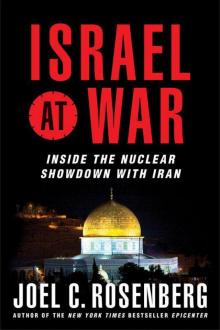 Israel at War: Inside the Nuclear Showdown With Iran
Israel at War: Inside the Nuclear Showdown With Iran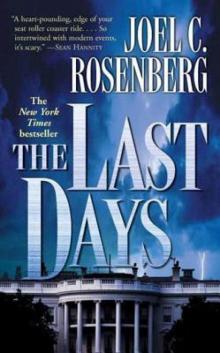 The Last Days
The Last Days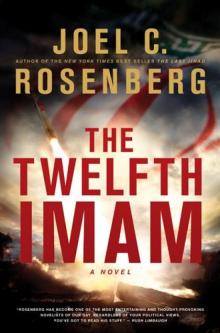 The Twelfth Imam
The Twelfth Imam Epicenter 2.0
Epicenter 2.0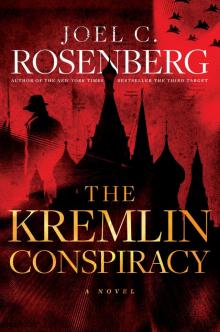 The Kremlin Conspiracy
The Kremlin Conspiracy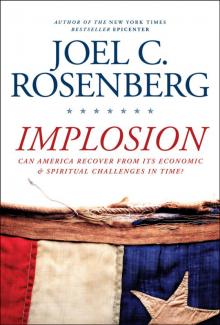 Implosion: Can America Recover From Its Economic and Spiritual Challenges in Time?
Implosion: Can America Recover From Its Economic and Spiritual Challenges in Time? The Third Target: A J. B. Collins Novel
The Third Target: A J. B. Collins Novel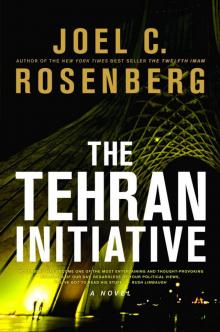 The Tehran Initiative
The Tehran Initiative Inside the Revolution
Inside the Revolution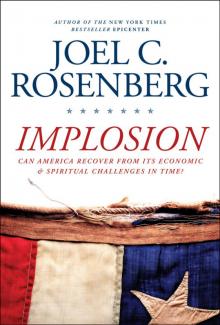 Implosion
Implosion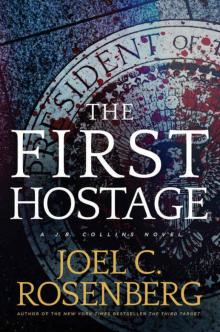 The First Hostage: A J. B. Collins Novel
The First Hostage: A J. B. Collins Novel